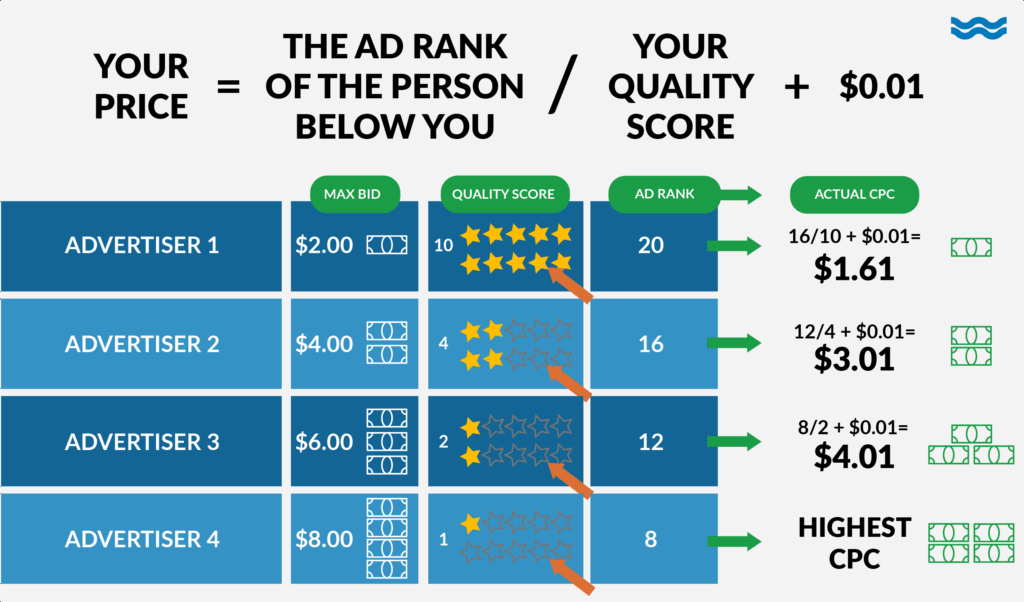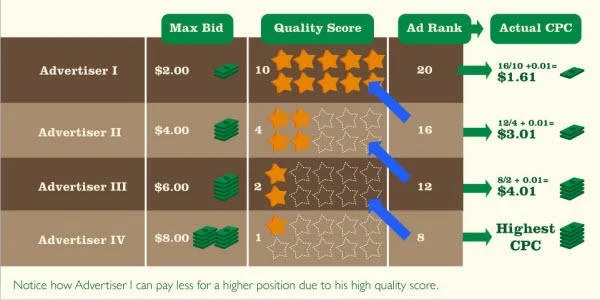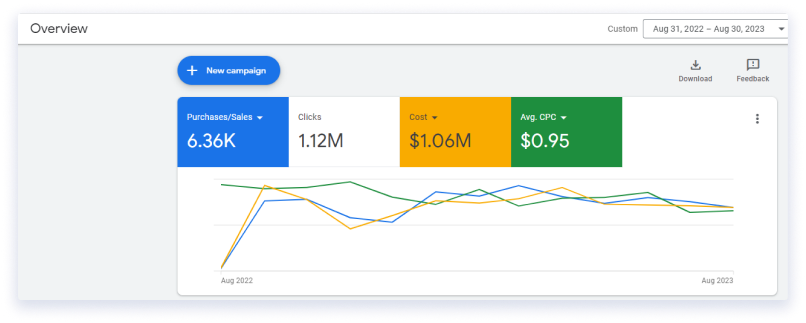How much does Google charge per click

When starting to run ads on Google, one of the most common questions is: “How much does Google charge per click?” This cost is not fixed but depends on various factors such as keywords, competition level, industry, and ad quality. In this article, RentAds will help you explore how Google determines the cost-per-click and what factors influence that cost.
What factors affect the cost per click (CPC) on Google Ads?

The cost per click (CPC) on Google Ads is not fixed but varies flexibly depending on several different factors. Understanding these factors helps advertisers optimize their budgets and achieve better results in their campaigns.
Advertising industry
One of the key factors is the business’s industry. Sectors with high competition such as real estate, construction, legal services, finance, interior design, etc., often have significantly higher CPC rates. This is because many businesses are bidding on high-value keywords, which raises the average bid prices considerably.
Keywords used in ads
Keywords are the core element that determines the competitiveness of an ad. Keywords with high search volume and strong conversion potential usually attract many advertisers to bid, increasing CPC costs. On the other hand, more specific or niche keywords with lower competition will typically have a lower price.
Quality Score
Google evaluates ads based on multiple criteria to determine how relevant and effective they are for users. The quality score is calculated based on three main factors: the landing page quality (related to user experience and SEO), the ad relevance (how closely the ad content matches the keywords), and the expected click-through rate (CTR). An ad with a high-quality score is more likely to appear in better positions at a lower cost.
Selected Ad Network
Google offers two main ad networks: the Search Network and the Google Display Network (GDN). The Search Network typically delivers higher conversion rates because users have clear intent, but the cost-per-click (CPC) is usually higher. In contrast, the Display Network targets users while they are browsing news or other websites, resulting in lower CPC but potentially lower conversion rates.
How much does Google charge per click

Google Ads does not apply a fixed cost per click (CPC – Cost Per Click). Instead, this cost is determined through a smart ad auction system. Every time a user searches for a keyword, Google runs an auction among advertisers who want their ads to appear for that keyword. In this auction, Google not only considers the amount you’re willing to pay but also evaluates several factors related to the quality and relevance of the ad.
The actual amount you pay per click is not simply the bid you set. It is the minimum amount required to outrank the advertiser directly below you, plus a small amount. Google uses a relatively complex formula to calculate this cost as follows:
CPC = (Landing Page Quality Score × Ad Quality Score × CTR) / Ad Rank
In which:
- CPC (Cost Per Click): The actual amount you pay for each click on your ad.
- Landing Page Quality Score: Evaluated based on the relevance and usefulness of the page users are directed to after clicking the ad. This depends on SEO, page age, loading speed, and actual traffic.
- Ad Quality Score: Reflects how relevant the ad content is to the keywords and the landing page. If the ad uses SEO-friendly keywords and matches user search intent, the quality score will be higher.
- CTR (Click-Through Rate): The ratio of clicks to impressions – a key indicator showing how attractive the ad is to users.
- Ad Rank: The position where the ad appears on Google’s search results page. A higher rank often means a higher cost, but not always – a high-quality ad can be shown in a top position at a lower price.
Guide to optimizing Google CPC ads
Cost-per-click (CPC) is a key factor that determines both the budget and the effectiveness of a Google Ads campaign. To effectively optimize CPC, you need to combine multiple strategies—from keyword research to ad content optimization and targeting the right audience.
Research and select strategic keywords
Start by identifying keywords that are closely related to the product or service you offer. Give priority to long-tail keywords or keywords with clear intent, which are more likely to drive conversions while having moderate competition. Also, use the Google Keyword Planner tool to compare bids and competition levels to align with your actual budget.
Optimize ad copy
An attractive, concise ad that matches user search intent can help increase the click-through rate (CTR), thereby improving your quality score. Make sure your headline is attention-grabbing, the description clearly states the benefits, and always include a strong call to action such as “Buy now,” “Free consultation,” or “Get a quote today.”
Improve landing page experience
A landing page with fast loading speed, a user-friendly interface, and content that matches the ad will help increase the quality score. Google always values user experience, so make sure the landing page is not only visually appealing but also provides useful and relevant information.
Use accurate targeting features
Make the most of targeting tools such as geographic location, age, gender, interests, or search behavior to ensure the ads reach the right people – at the right time – with the right needs. This not only helps increase conversion rates but also prevents wasting budget on low-potential audiences.
Monitor and continuously optimize the campaign
Do not let ads run automatically for too long. Regularly track key metrics such as CPC, CTR, conversion rate, and quality score to adjust keywords, ad copy, or target groups accordingly. Google Ads is a highly dynamic platform, so continuous optimization is the key to maintaining strong performance with reasonable CPC.
CPC depends on several factors such as industry, keyword competition, quality score, and ad position. Understanding how Google calculates charges helps you build a smarter advertising strategy, optimize your budget, and achieve better results in each campaign.
Contact Info
We provide services google ads account for rent nationwide, and with a team of experienced and qualified staff who both support advertising and can directly perform Facebook advertising if you need. Contact us via phone number.
Frequently Asked Questions
CPC differs because Google Ads operates on an auction-based system. Industries with high competition – such as real estate, insurance, or finance – usually have many advertisers willing to pay higher amounts for better ad placements, which drives up bid prices. Additionally, keywords with high search volume, strong conversion potential, or those related to purchasing behavior often have higher CPC.
To lower CPC without sacrificing performance, you should:
Optimize quality score by improving ad content, landing pages, and click-through rate (CTR).
Choose relevant keywords and avoid overly competitive or irrelevant ones for your business goals.
Target the right audience to avoid wasting the budget on low-value clicks.
Monitor and optimize campaigns regularly, adjust bids, and remove ineffective ads.
Maintaining performance while reducing CPC is completely achievable with the right advertising strategy and continuous optimization.